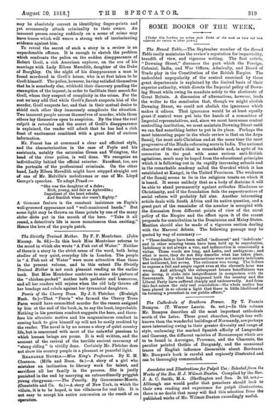SOME BOOKS OF THE WEEK.
[1.7ndsr this trading vs nctics such Locks of ILs vesk as Lars not Len scserscd fcr leticic In other jorms.)
The Round Table.—The September number of the Round Table easily maintains the review's reputation for impartiality, breadth of view, and vigorous writing. The first article, "Downing Street," discusses the part which the Foreign, Colonial, India, and War Offices, Admiralty, and Board of Trade play in the Constitution of the British Empire. The undoubted unpopularity of the control exercised by these great departments is explained by the limited basis of their superior authority, which directs the Imperial policy of Down- ing Street while owing its mandate solely to the electorate of Great Britain. A discussion of alternatives, however, leads the writer to the conclusion that, though we might abolish Downing Street, we could not abolish the ignorance which makes it odious. That ignorance would be at least equally great if control were put into the hands of a committee of Imperial representatives, and, since we must have some central controlling institution, we must maintain Downing Street until we can find something better to put in its place. Perhaps the most interesting paper in the whole review is that on the Arya Samaj, the most anti-Christian and at the same time the most progressive of the Hindu reforming sects in India. The national character of the sect's ideal is remarkable and, in spite of its connexion in the past with some serious anti-British agitations, much may be hoped from the educational principles which it is following out in its rapidly increasing schools and in the remarkable academy called the Gurukul which it has established at Kangri, in the United Provinces. The weakness of the Samej seems to lie in the religious tenets on which it is based. It seems unlikely that as a body of doctrine it will be able to stand permanently against orthodox Hinduism or Christianity, and if the foundation fails the superstructure of social reform will probably fall also. Another interesting article deals with South Africa and its native question, and a great part of the remainder of the number is occupied with the discussion from different points of view of the naval policy of the Empire and the effect upon it of the recent proposals for contribution in the Dominions and Malay States. Mention should also be made of a vigorous section dealing with the Marconi debate. The following passage may be quoted by way of summary :—
4 "These dealings have been called 'indiscreet' and indelicate' and in other mincing terms have been held up to reprobation. Indelicacy is not always a vice, and indiscretion is occasionally a virtue. These words are long, and Latin, and ambiguous ; and what is more, they do not fitly describe what has taken place. The simple fact is that the transactions were not merely indelicate and indiscreet, but wrong. The reticence was wrong. The failure to express a full and ample regret even at the eleventh hour was wrong. And although the subsequent brazen boastfulness was also wrong, it sinks into insignificance in comparison with its forerunners. By what has happened both the country and the Liberal Party have suffered sharply and undeservedly. And from this fact arises the only real consolation—the whole matter has been placed in so odious a light that there is little likelihood of its forming a precedent in our public affairs."


































 Previous page
Previous page